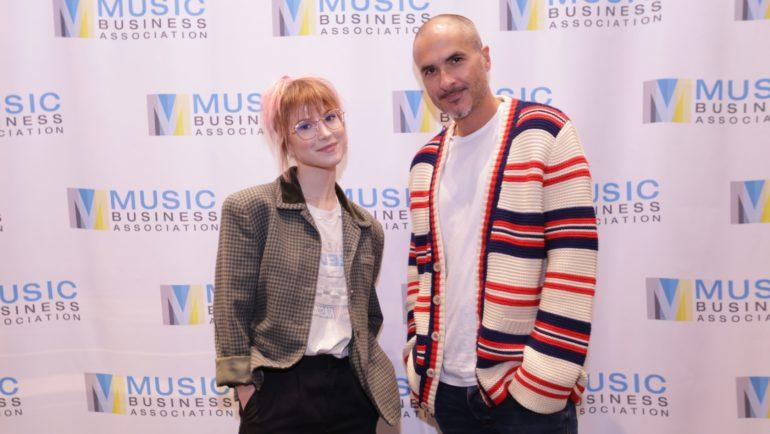Paramore’s Haley Williams Interviews Beats 1’s Zane Lowe at Music Biz Keynote
By Cillea Houghton
LOS ANGELES (Variety.com) – The keynote interview with Beats 1 anchor Zane Lowe at the Music Biz conference in Nashville on Sunday had a counterintuitive format: He was interviewed by someone a lot more famous than he is, Paramore frontperson Hayley Williams. Despite her star power, the singer largely played it straight as an interviewer and allowed Lowe to have the spotlight, although both talked about the power artists have in this ultra-connected world.
Lowe said that when he first joined Beats 1 in 2015, he faced some challenges moving from to a streaming platform from the giant BBC Radio 1. He said a friend in the industry gave him valuable perspective after Lowe stated he didn’t feel the same sense of purpose, now that music is so widely accessible. “He said to me, ‘You’re completely missing the point: It was never about when you had the record, it was how you played the record,’” Lowe rcalled. “That changed everything in a big way: We had to do our job [and figure out how] to be a really valuable part of new music.”
Lowe also spoke of ways that streaming culture has moved power into the hands of artists, a change he says has gained traction within the past four years, citing Billie Eilish and Chance the Rapper as two model examples of artists using creative tools to distribute their work. Williams explained how streaming feels natural to her as an artist and member of a band born in the digital age. “To me as an artist, it’s strange that this was never normal for us, because we were always so headstrong and adamant about how an album cycle would look. Being able to cut out the middleman in that way, I feel more connected to the listener now than I did from 2007-2015,” she said.
However, Williams admitted it took her some time to warm up to streaming, as she grew up discovering new bands when they toured with her favorite artists, and by making frequent trips to the popular Nashville record store Grimey’s. “It’s how I found about so many cool bands,” she recalled. “We may not have that exact experience now, but I really love what playlisting has done for me as a music consumer, as someone who really needs to discover things.”
Williams says that her bandmates Taylor York and Zac Farro were the ones who opened her eyes to streaming. She drew comparisons to their middle school days, when York would find their new favorite bands and Farro would make the mix CDs — eventually, those CDs turned into playlists. “As we got older, they were using streaming services more, while I was still trying to be super romantic and go to Grimey’s and buy my records,” Williams says. “For me, it wasn’t until [the group’s 2017 album] ‘After Laughter’ that streaming felt like a really exciting part of the roll-out strategy.”
Lowe also spoke of the importance a message can have in drawing fans to a work, citing Jay Z’s “4:44” album as being centered around a theme (atoning for the transgressions his wife Beyonce addressed in her “Lemonade” album) rather than aiming for a radio hit. “It’s about understanding your audience and knowing what you think that is going to get their attention,” he said. “It’s an extension of the themes and the mood of the record: You’re going to serve the purpose of that project so that the audience understands in a deeper way what it means to you.”
Indeed, he says that can be a foundation of the connection between artist and listener. “Artists really make music because they want empathy,” Lowe said. “We’re discovering so much more about ourselves as people in terms of our vulnerabilities and our insecurities and our emotions. One of the things that I think is really important is the conversation around the human spirit continues to get loud — and music is at the very core, one of the most powerful ways of amplifying that conversation.”

